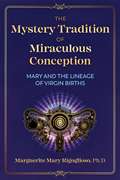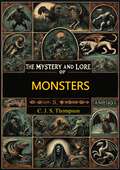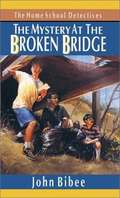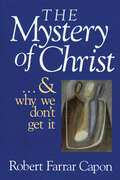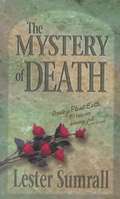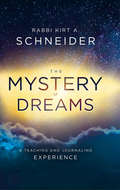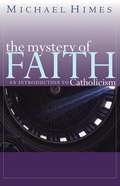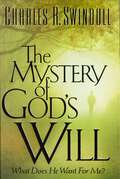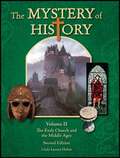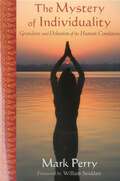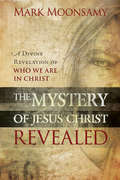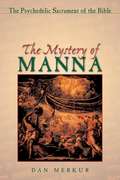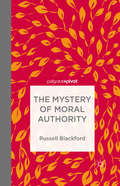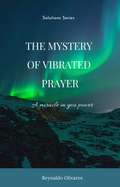- Table View
- List View
The Mystery Tradition of Miraculous Conception: Mary and the Lineage of Virgin Births
by Marguerite Mary Rigoglioso• Explains how Mary was born into a lineage of powerful women who cultivated and passed on the ability to consciously conceive elevated beings • Includes a complete translation of the Infancy Gospel of James and reveals the hidden codes it contains relating to the practice of miraculous conception • Shows how Mary was trained and initiated in the &“womb mysteries&” and reveals the esoteric techniques she used to conceive Jesus Delving into one of the Virgin Mary&’s forgotten gospels, the Infancy Gospel of James, Marguerite Mary Rigoglioso, Ph.D., reveals a truth that has been suppressed for nearly two millennia: that Mother Mary was not a passive bystander to her own pregnancy but an advanced member of a sacred order of women trained in divine conception. Unlocking the hidden codes of Mary&’s gospel and other ancient source texts, the author reveals how Mary conceived Jesus through a careful process that she willed and initiated. She explains how Mary was born into a family of powerful priestesses, women who possessed, cultivated, and passed on the ability to consciously conceive elevated beings to help the planet. This lineage included Mary&’s own mother, Anne, who conceived Mary with this method, her relative Elizabeth (mother of John the Baptist), and the biblical matriarch Sarah, the wife of Abraham and mother of Isaac. These women were schooled in the shamanic &“womb mysteries,&” secret knowledge of the capacity of the womb. Decoding the Infancy Gospel of James, the author shows how Mary was trained and initiated, reveals the esoteric techniques she used to conceive Jesus, and explores the birth itself and the mind-altering reality that accompanied it. By revealing the Virgin Mary as a trained holy woman and a conscious actor in the conception of Jesus, the author corrects the impression we have been given of a passive and bewildered girl who had no idea how or why she was pregnant. She also restores Mary as the empowered feminine orchestrator of these significant events, paralleling the redemption of Mary Magdalene in recent years. Explaining how and why virgin birth was accomplished, this book allows us to make sense of miraculous conception and reveals the power that lies in all women&’s wombs.
The Mystery and Lore of Monsters
by C J S ThompsonThe Mystery and Lore of Monsters by C. J. S. Thompson is a captivating journey into the shadowy world of mythological creatures, legendary beasts, and the strange beings that have haunted human imagination for centuries. This meticulously researched book delves into the origins, symbolism, and cultural significance of monsters across different civilizations and time periods, offering readers a comprehensive exploration of the lore that surrounds these enigmatic entities.Thompson, a respected historian and folklorist, draws on a vast array of sources to uncover the stories and beliefs that have given rise to some of the most enduring and terrifying figures in mythology. From dragons and sea serpents to werewolves, vampires, and more obscure creatures, The Mystery and Lore of Monsters examines how these beings have been depicted in art, literature, and folklore, revealing their roles as symbols of fear, the unknown, and the dark forces of nature.In addition to exploring the mythical and cultural aspects of monsters, Thompson also investigates the historical context in which these legends emerged, offering insights into how societal fears, religious beliefs, and natural phenomena contributed to the creation of monster lore. He discusses the psychological impact of these creatures on human consciousness, illustrating how monsters have been used to explain the unexplainable and to embody humanity’s deepest fears and anxieties.The Mystery and Lore of Monsters is a must-read for anyone fascinated by mythology, folklore, and the enduring power of the monstrous in human culture. Thompson’s engaging writing and thorough scholarship make this book a timeless reference for students of mythology, historians, and anyone with an interest in the strange and the supernatural.This book not only uncovers the origins and evolution of some of the world’s most famous monsters but also invites readers to explore the darker corners of the human psyche where these creatures reside. C. J. S. Thompson’s work continues to intrigue and inspire, offering a rich and detailed look at the lore of monsters that has captivated the human imagination for generations.
The Mystery at the Broken Bridge (The Home School Detectives #6)
by John BibeeJosh and the other Home School Detectives join their church in a Good Friday service project at the Bridgewood Apartments, and Josh's new basketball disappears. Josh suspects the "Bridge Kids," a rough group who claim the broken-down wooden footbridge near their apartment as their territory. But when Ms. Carson's stolen purse is found in Josh's guitar case, he becomes a prime suspect himself. How can Josh defend himself against the false charges? Why is there sudden rash of stealing? Who wants to meet Josh secretly to answer his questions? These and other mysteries set the Home School Detectives on a case that reveals not only a greedy, cold-hearted scheme, but also the importance of building bridges.
The Mystery at the Wheeler Place (Wren House Mystery #1)
by Hilda StahlAlone in Mrs. Wheeler's house, Wren froze as she heard a key grate in the lock. No one else was supposed to be there! Hiding swiftly behind the sofa, Wren watches as a strange man and woman drag a young boy into the house and close the door. Wren, a curious, active ten-year-old, loves mystery, but this time she finds herself and her friends in danger as they seek to solve THE MYSTERY AT THE WHEELER PLACE. Wren and her fifth grade friends solve more mysteries in Bookshare's library. Look for #4 The Missing Newspaper Caper. There are also three books by Hilda Stahl about Elizabeth Gail.
The Mystery of Christ . . . and Why We Don't Get It
by Robert Farrar CaponWidely recognized as a creative, insightful writer, Robert Farrar Capon offers still more of his uniquely provocative fare in The Mystery of Christ . . . and Why We Don't Get It. This engaging book probes the meaning of salvation — peace, forgiveness, grace, reconciliation — spoken of in the New Testament as a "mystery." Reminding his readers, sometimes in startling ways, that salvation is a gift rather than a transaction, Capon uses a variety of dialogues to drive home the truth that "there is therefore now no condemnation for those who are in Christ Jesus." Along the way he explores guilt, forgiveness, love, anger, romance, grief, spiritual contentment, the Incarnation, reincarnation, resurrection, and more — and manages to make salvation something fresh and new in the process.
The Mystery of Death
by Lester SumrallDeath is both a collective and individual experience. All humans die, and yet the mystery lies in the solitary experience. It is a trip we all make alone. In The Mystery of Death, Lester Sumrall draws on 66 years of ministry experience in helping us sort out this transition of life. From the jungles of Africa to the modern hospitals of the United States, Dr. Sumrall has observed death - the pain, peace, resistance, and acceptance. His unique storytelling paints a picture of death that is not hopeless. Calling death "a monster," Dr. Sumrall explains in vivid detail its origins, and why he has come to a place where he has no dread of it. Dr. Sumrall also addresses these points: Life after Death Worshiping the Dead Searching for Immortality In Those Final Moments Death by Suicide Coping with Death and Grief
The Mystery of Dreams: A Teaching and Journaling Experience
by Rabbi Kirt SchneiderGod speaks to you not only through His Word, but through your dreams too. Scripture confirms that one of the primary ways God speaks to His people is through dreams. In this remarkable book Rabbi Schneider, a Jewish believer in Jesus, shows through personal examples from his own life, as well as biblical examples, how the Lord is still speaking to His people today through their dreams. Rabbi Schneider demonstrates how we can do the following: Receive directionBe encouragedReceive revelationBe warnedBe prepared for what we&’re about to face in our futureBe launched into our destinies by paying attention to how the Spirit is speaking to us through our dreams at night Readers will also learn how to record and interpret their dreams in this important and exciting resource. This book will help you understand how God speaks to you through your dreams so that you can receive direction, encouragement, and revelation.
The Mystery of Faith: An Introduction to Catholicism
by Michael J. HimesIn his familiar, conversational style, Father Himes invites the reader to consider ten basic truths of Catholicism. Beginning with discussions of Trinity, Grace, the Incarnation and Salvation, Himes moves into an exploration of Church as the continuting presence of Jesus Christ in the world today. After discussing what Baptism and the baptismal commitment really involves, he focuses on Eucharist, showing the importance of the sacrament for personal growth and for the building of community. After discussing the Sacraments of Matrimony and Holy Orders, Himes explores the importance of the sacrament of reconciliation in the Christian community, and concludes with a discussion of the great gift to the church that we know as tradition. Based on Father Himes' popular video series, The Mystery of Faith, this book includes questions for reflection and discussion at the conclusion of each chapter. An excellent resource for small groups or parish learning communities seeking to revitalize and deepen their understanding of basic Catholic beliefs.
The Mystery of God's Will: What Does He Want For Me?
by Charles Swindoll"I don't think I've ever met anyone who hasn't struggled with the desire to know God's will. The problem is, this struggle often involved a great deal of confusion and worry." -Chuck Swindoll Many people have the idea that if they could just somehow find that single planned direction, they would be effortlessly swept through life. But life is not like that. Probably the most misunderstood factor of discovering God's will is the thought that, If I do this, the struggles will end, the questions are over, the answers come, and I live hapily ever after. But that's not reality.Does that mean that God's will must remain opaque to us-that we must muddle and grope blindly through life with no clue to what He wants for us? "Not at all," says Charles Swindoll.In this groundbreaking book, Swindoll invites us to join him on a spiritual quest. "I believe God's will for us in this life is not some black-and-white objective designed to take us to an appointed destination here on earth as much as it is about the journey itself . . . and what matters to Him in our lives."The Mystery of God's Will overflows with practical insights, humor, and unforgettable stories that will de-mystify, clarify, and put your mind at ease.
The Mystery of History Volume IV: Wars of Independence to Modern Times
by Linda Lacour HobarThe Mystery of History series is everything a family needs for teaching history with a strong Biblical worldview. Multi-age activities, book and video lists, memory helps, timeline suggestions, quizzes, and map work included. Chronological, Classical, Complete. Volume 4 covers "Wars of Independence to Modern times" and is recommended for 6th grade and up.
The Mystery of History: The Renaissance, Reformation, and Growth of Nations (Volume #3)
by Linda Lacour HobarThe Mystery of History Volume III Student Reader continues the spectacular and provocative study of world history from the viewpoint of a Christian author. Spanning the Renaissance, Reformation, Exploration, and some early American history, this volume explores the backdrop to and the significance surrounding the time-honored contributions found in art, music, literature, science, and philosophy of this rich era. Unlike Volumes I and II, Volume III has been separated by the publishers into two beautiful books! The Student Reader now contains 84 stirring lessons written by Linda Lacour Hobar in a colorful, easy-to-hold hardback. The reader is a stand alone world history text for all ages to enjoy.
The Mystery of History: Volume 1 Creation to the Resurrection (Second Edition)
by Linda Lacour HobarGives you an insight in the Creator's Creation as God Himself tries to let us know him.
The Mystery of History: Volume Two
by Linda Lacour HobarAn engaging, historically accurate Christ-centered approach to the early church and the Middle Ages. Journeying from A.D. 33 to 1456, your students will explore the lives and legacies of New Testament figures, church leaders, kings, queens, Vikings, samurai, scientists, and more. This revised full-color edition features a unique code to access the downloadable companion guide. Grades 5 to 6.
The Mystery of Individuality: Grandeur and Delusion of the Human Condition
by Mark PerryThe Mystery of Individuality explores the nature of human individuality through twelve chapter-mirrors, whose main focal points are spirituality, psychology, sociology, and love, and also the meaning of sacred art. The issues of leadership and justice, as well as of politics, and even crime, are also examined in depth, along with the roles of sexuality and marriage. Finally, man and woman are defined in the context of both cosmology and society, with a special emphasis on the divine nature of a human being and what this entails morally and socially. Perry bases his assessments on the guiding image of archetypal man, namely of a being created in the image of God. At the same time, he does not shy away from addressing what the distortion of this archetype entails. He asserts that in creating man, God lent him his own immortal personhood, namely all that we find most lovable in another human creature, in other words his personality. But finally the question for each of us comes down to remembering our divine essence without forgetting our human nothingness.
The Mystery of Jesus Christ Revealed: A Divine Revelation of Who We Are in Christ
by Mark MoonsamyIn September 1997, Mark Moonsamy had a supernatural experience in which Jesus appeared to him in a vision. Mark was transformed in the spirit and drawn into the body of Jesus Christ, where he received a powerful message from God. This message remained hidden in him for almost 14 years, until the Holy Spirit began revealing the mystery of Jesus Christ, confirming this amazing revelation through the Word of God. God wants the present-day church to come to the full understanding of who we are in Christ, as we anticipate a great move of God upon the earth. Mark has been commissioned to deliver this message to the body of Jesus Christ and to prepare the saints of God for the remarkable supernatural awakening that has already begun.
The Mystery of Manna: The Psychedelic Sacrament of the Bible
by Dan Merkur• Compelling evidence that the early Jews and Christians used psychedelics as part of their religious rites.• Reveals the Bible's disguised references to this tradition and traces knowledge of this secret to the gnostics, masons, kabbalists, and the legends of the Holy Grail. • Explores the idea that psychedelics have played a role in nearly all religious traditions.When Moses fed manna to the Israelites, he told them that after eating the miraculous bread they would see the glory of God. And indeed they did: "They looked toward the wilderness, and behold, the glory of Yahveh appeared in a cloud." In The Mystery of Manna, religious historian Dan Merkur provides compelling evidence that this was the Israelites' initiation into a psychedelic mystery cult that induced spiritual visions through bread containing ergot--a psychoactive fungus containing the same chemicals from which LSD is made. Citing biblical material, as well as later Jewish and Christian writings, Merkur reveals the existence of an unbroken tradition of Western psychedelic sacraments, from Moses and manna to Jesus and the Eucharist. Most important, Merkur shows that this was not a heretical tradition, but instead part of a normal, Bible-based spirituality, a continuation of the ancient tradition of visionary mysticism. Even when this practice became unacceptable to the religious orthodoxy, it was perpetuated in secret by gnostics, masons, and kabbalists, as well as through the legends of the Holy Grail. Merkur traces a long line of historical figures who knew of manna's secret but dared only make cryptic references to it for fear of persecution. The Mystery of Manna is the strongest contribution yet to our growing realization that, contrary to popular belief, psychedelics and religion have always gone hand in hand.
The Mystery of Mar Saba
by James H. HunterA novel set during the rise of Hitler and Nazi Germany about a plot to destroy Britain by destroying Christianity. The book revolves around a secret cult, "the Hooded Ones," attempting to forge a document referred to as "the Shred of Nicodemus," which refutes the Resurrection. The hope is that the document's release will demoralize the British empire, making it easier for Hitler to conquer Europe.
The Mystery of Mary (Grace Livingston Hill #86)
by Grace Livingston HillWhen a beautiful young woman approaches wealthy Tryon Dunham at a train station and tells him she is in danger, he agrees to see her to safety. Then, before he can learn any more about her other than that her name is Mary and she is running to Chicago, she is gone. But Tryon cannot forget Mary's beautiful face and spirit. Soon he finds himself trying desperately to solve the mystery that surrounds her... a mystery that could overwhelm them both. And he determines to discover the true identity of the young woman he longs to protect--and love. Grace Livingston Hill is the beloved author of more than 100 books. Read and enjoyed by millions, her wholesome stories contain adventure, romance, and the heart-warming triumphs of people faced with the problems of life and love. You'll find dozens more novels by Grace Livingston Hill in the Bookshare library such as: #18. Brentwood, #19. Daphne Deane, #22 Rose Galbraith, #24. By way of the silverthorns, #26. The Seventh Hour, #30. Matched Pearls, #33. Happiness Hill, #36. Patricia, #38. Spice Box, #41. blue ruin, #42. A New Name, #47. The Street of the City, #50. The Finding of Jasper Holt, #55. Ladybird, #60. Miranda, #61. Mystery Flowers, #66. The Girl From Montana, #67 A Daily Rate, #68. The Story of a Whim, #69. According to the Pattern, #70. in the way, #71. exit Betty, #72. The White Lady, #73. Not Under the Law and #74. Lo Michael. Many more are in the collection or are on the way.
The Mystery of Moral Authority
by Russell BlackfordThe Mystery of Moral Authority argues for a sceptical and pragmatic view of morality as an all-too-human institution. Searching, intellectually rigorous, and always fair to rival views, it represents the state of the art in a tradition of moral philosophy that includes Thomas Hobbes, David Hume, and J.L. Mackie.
The Mystery of Redemption and Christian Discipleship
by James Socias Peter V. ArmenioYou will find a tremendous mystery of faith in the heart of The Mystery of Redemption and Christian Discipleship by Father Peter Armenio and James Socias.
The Mystery of Ruby's Ghost (Bee There #2)
by Lael LittkeFive twelve-year-old friends from a Beehive church group in California go to work as hostesses on a historical farm in Utah and are caught up in the mystery of a young girl who disappeared in the 1920s. When the five Bee Theres, members of Becca’s Beehive class, spend two weeks at a historical farm in Utah, little do they realize they will encounter ghosts from the past. The suspense mounts as the girls try to discover why a young woman named Ruby vanished seventy years ago, without saying a word to anyone. Why did she hide the wooden box in the wall behind the baseboard? Who carved her initials in the barn? What does Eli, the old farmhand, know? Is Becca just dreaming that someone is crying for help in the storm outside? What is the ghost --if it is a ghost --trying to tell her? Join Becca, Carlie, Elena, Marybeth, and Sunshine as they try to solve The Mystery of Ruby’s Ghost. You'll find the whole Bee There's series in the Bookshare library including #1. Getting Rid of Rhoda, #3. Star of the Show, #4. There's A Snake At Girl's Camp, #5. The Bridesmaids' Dress, #6. Run, Ducky Run and #7 The Phantom Fair.
The Mystery of Spring-Heeled Jack: From Victorian Legend to Steampunk Hero
by John MatthewsAn extensive investigation of the origins and numerous sightings of the mysterious and terrifying figure known as Spring-Heeled Jack • Shares original 19th-century newspaper accounts of Spring-Heeled Jack encounters as well as 20th and 21st-century reports • Explains his connections to Jack the Ripper and the Slender Man • Explores his origins in earlier mythical beings from folklore, his Steampunk popularity, and the theory that he may be an alien from a high-gravity planet Spring-Heeled Jack--a tall, thin, bounding figure with bat-like wings, clawed hands, wheels of fire for eyes, and breath of blue flames--first leapt to public attention in Victorian London in 1838, springing over hedges and walls, from dark lanes and dank graveyards, to frighten and sometimes physically attack women. News of this strange and terrifying character quickly spread, but despite numerous sightings through 1904 he was never captured or identified. Exploring the vast urban legend surrounding this enigmatic figure, John Matthews explains how the Victorian fascination with strange phenomena and sinister figures paired with hysterical reports enabled Spring-Heeled Jack to be conjured into existence. Sharing original 19th-century newspaper accounts of Spring-Heeled Jack sightings and encounters, he also examines recent 20th and 21st-century reports, including a 1953 UFO-related sighting from Houston, Texas, and disturbing accounts of the Slender Man, who displays notable similarities with Jack. He traces Spring-Heeled Jack’s origins to earlier mythical beings from folklore, such as fairy creatures and land spirits, and explores the theory that Jack is an alien marooned on Earth whose leaping prowess is attributed to his home planet having far stronger gravity than ours. The author reveals how Jack the Ripper, although a different and much more violent character, chose to identify himself with the old, well-established figure of Spring-Heeled Jack. Providing an extensive look at Spring-Heeled Jack from his beginnings to the present, Matthews illustrates why the worldwide Steampunk community has so thoroughly embraced Jack.
The Mystery of Vibrated Prayer: One Miracle in you Power (Solutions series #1)
by Reynaldo OlivaresIn 1999 my life as a writer and lawyer was surprised by an unfortunate event; I was the victim of a work of sorcery. Strange oppressions in my head, legs and trunk compromised my well-being, my health. Thank God I have always been in good health; With sports and an active life I had learned to know my body, it was not a problem that could be solved with medical attention; the origin of that condition was different, I knew how to identify it. When I sought the help of some people who knew about these evil influences, they all confirmed what I thought. In that thorny stretch of seeking guidance, I passed through esoterics, witches, pastors, counselors and even priests of my religion. This book talks about my experience and how I managed to develop, by stumbling, a defense system against that adversity, Vibrated Prayer.
The Mystery of the Aleph
by Amir D. AczelThe history of infinity emphasizing the people who were interested in the concept. Stresses philosophical and religious importance of mathematical ideas throughout history. Fascinating even if math is not your strong suit.
The Mystery of the Black Hole Mine (D. J. Dillon Adventure #7)
by Lee RoddyD.J. gets a bad case of "gold fever" when he and Alfred accidentally discover an abandoned-- and mysteriously dangerous-- gold mine.
